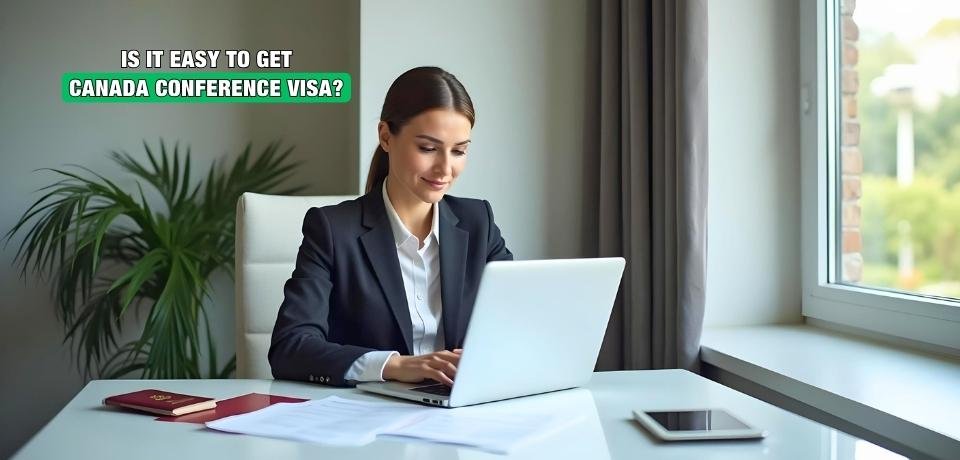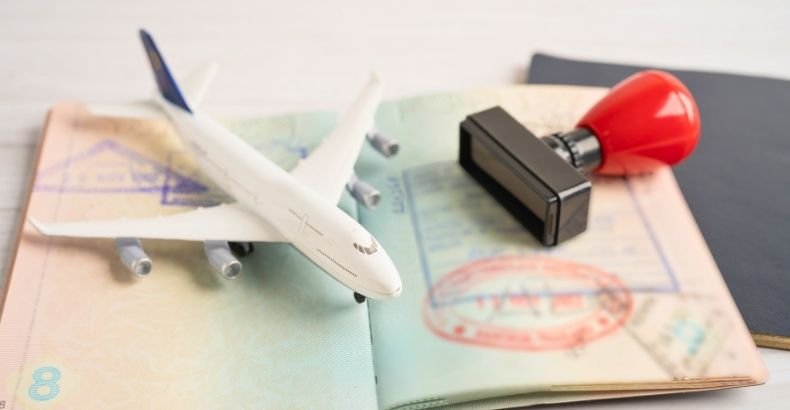Your cart is currently empty!

Securing a visa can sometimes feel overwhelming, especially when planning to attend an international conference. If you’re asking yourself, “Is it easy to get Canada conference visa?”—you’re not alone. Many international attendees wonder about the process and how challenging it might be.
The good news is that, with the right preparation and thorough knowledge of the requirements, getting a Canada conference visa is very manageable. However, you have to ensure that your application meets all criteria to avoid unnecessary delays or complications.
Want to make the process even smoother? Follow along as we dive deeper into the steps, tips, and common challenges to help you successfully apply for a Canada conference visa.
What Are the Key Requirements for a Canada Conference Visa?
When applying for a Canada conference visa, meeting specific requirements is crucial for a smooth and successful process. Here are the key requirements you’ll need to fulfill:

Valid Passport
A valid passport is the first and most important document you’ll need. Ensure that your passport is not only up-to-date but also has at least six months of validity remaining from your intended date of travel.
Conference Invitation Letter
One of the most critical components of your visa application is the invitation letter from the conference organizers. This letter should outline the event details, your role or participation, and the dates of the conference. It proves the reason for your visit to Canada.
Proof of Financial Support
You’ll need to show that you have the financial means to support yourself during your stay in Canada. Bank statements, sponsorship letters, or proof of employment can serve as valid documents to show you can cover your travel, accommodation, and other expenses.
Purpose of Visit
Your application must clearly state the purpose of your visit. This means providing documentation that explains your professional or academic background, how the conference aligns with your work, and why attending the event is essential for you.
Travel Itinerary
A well-detailed travel itinerary that includes flight bookings, accommodation reservations, and conference details helps strengthen your visa application. This shows the Canadian immigration officials that you have planned your visit thoroughly and intend to return home afterwards.
Ties to Your Home Country
Demonstrating strong ties to your home country is another key requirement. These can include employment, family obligations, or property ownership. Providing evidence of this helps assure immigration officials that you will return after the conference.
No Criminal Record
A clean criminal record is essential for visa approval. You may be asked to provide a police clearance certificate to show that you have no criminal background.
Is It Easy to Get Canada Conference Visa?
The ease of the application process largely depends on your preparation. If your documents are in order and you meet the necessary criteria, the application is quite straightforward. Canada’s visa application system allows you to apply online, making it convenient.

However, you may also apply in person at a Canadian visa office if preferred. Typically, the application process includes filling out forms, submitting your documents, and attending an interview if required. Keep in mind that visa approval depends on your specific situation and whether the immigration officer is satisfied with the information you’ve provided.
Applying for a Canada conference visa can feel daunting, but several factors can significantly influence how smooth or challenging the process is. The knowledge of these factors can help you better prepare, increasing your chances of a hassle-free experience.
Let’s explore the key factors that impact the ease of your visa application process.
Your Country of Residence
One of the most significant factors affecting the ease of obtaining a Canada conference visa is your country of residence. Some countries have more stringent visa requirements due to diplomatic relations or immigration policies. Applicants from countries that require a Temporary Resident Visa (TRV) may face a lengthier application process than those from visa-exempt countries, who might only need an Electronic Travel Authorization (eTA).
Completeness of Documentation
The most common reason for delays or visa denials is incomplete or inaccurate documentation. The requirements for a Canada conference visa include having a valid passport, a formal invitation letter from the conference organizers, proof of financial stability, and evidence of ties to your home country. Missing or outdated documents can result in processing delays or outright rejections, so double-check everything before submitting.
Purpose of Travel
The clarity of your travel purpose plays a vital role in determining how easily your visa gets approved. Since you are applying for a conference visa, you should have a formal invitation letter that outlines the event details, your role, and why attending is necessary. Visa officers are more likely to approve applications when the reason for travel is clear, legitimate, and well-documented.
Proof of Financial Stability
Your financial situation is another key factor. Immigration officers need to be confident that you can support yourself during your stay in Canada and that you won’t be financially dependent on the country. Providing bank statements, proof of employment, or other financial documents demonstrating sufficient funds for your trip can make the application process smoother.
Strong Ties to Your Home Country
Another very important factor is how well you demonstrate ties to your home country. Visa officers want to ensure you will return to your country after the conference. Having a steady job, property, or close family ties can strongly influence their decision. Including evidence like employment letters or property ownership can significantly improve the chances of a successful application.
Timely Application
Applying early is always advisable, as it gives you ample time to handle any issues that may arise. Visa processing times can vary based on where you are applying from, and waiting until the last minute could lead to stress or missing your conference. The ease of obtaining a Canada conference visa depends on several factors, including your country of residence, the completeness of your documentation, your financial stability, and your ties to your home country.
Step-by-Step Guide to Applying for a Canada Conference Visa
Attending a conference in Canada is an exciting opportunity, but first, you need to secure your visa. Thankfully, the Canada conference visa application procedure is straightforward if you follow the necessary steps carefully. Here’s a step-by-step guide to help you manage the process smoothly.
Step 1: Check if You Need a Visa
The first step is to determine if you require a visa to attend a conference in Canada. Citizens of visa-exempt countries only need an Electronic Travel Authorization (eTA), but others will need a Temporary Resident Visa (TRV) to enter Canada. Check the official Canadian government website to confirm the requirements for your country.
Step 2: Gather Required Documents
Before applying, collect all the necessary documents to support your visa application. You will typically need:
- A valid passport
- A formal invitation letter from the conference organizers
- Proof of financial stability (bank statements)
- Travel itinerary
- Proof of ties to your home country (e.g., employment, family)
- Two passport-sized photos
Make sure all documents are accurate and up-to-date, as incomplete applications can result in delays.
Step 3: Complete the Application Online
Most applicants can apply for a Canada conference visa online. Visit the Government of Canada’s official immigration portal and create an account. Once logged in, complete the application form, ensuring all fields are filled correctly. You’ll need to upload scanned copies of your documents during this process.
Step 4: Pay the Application Fees
The application fee for a Temporary Resident Visa is CAD 100, with an additional CAD 85 for biometric data collection if required. Be sure to submit these fees through the portal as part of your application process.
Step 5: Submit Biometrics
If required, you’ll need to visit a Visa Application Center (VAC) to submit your biometric information, including fingerprints and a photograph. This step is mandatory for most applicants and helps confirm your identity.
Step 6: Wait for Processing
After submission, the processing time can vary based on your location and season. On average, it takes a few weeks, so apply well in advance of your conference. You can track the status of your application online through the same portal.
Step 7: Attend an Interview (If Required)
In some cases, applicants may be asked to attend an interview. The Canada conference visa interview requirement depends on factors such as your travel history, background, and the visa officer’s discretion. Be prepared to explain your purpose for visiting and provide any additional documentation if needed.
Common Challenges When Applying for a Canada Conference Visa
Applying for a conference visa to Canada can be an exciting opportunity, but it often comes with its share of challenges. Here are some common hurdles applicants face.

Knowing the Visa Requirements
Finding out the visa requirements can be daunting. Each applicant must understand the specific documentation needed, such as a valid passport, an invitation letter from the conference organizer, and proof of financial support. Incomplete or unclear documents can lead to delays or denials.
Financial Documentation
Demonstrating sufficient funds is crucial. Applicants often struggle to provide clear evidence of financial stability, such as bank statements or employment letters. You have to show that you can cover travel, accommodation, and other expenses while in Canada.
Time Constraints
The application process can be time-consuming. Many applicants underestimate the time required for processing, which can take weeks or even months. Apply well in advance to avoid missing the conference.
Lack of Clarity in Purpose
Clearly articulating the purpose of the visit is vital. Applicants sometimes fail to explain adequately why attending the conference is important for their professional development. A well-crafted personal statement can make a significant difference.
Language Barriers
For non-English or French speakers, language can be a significant barrier. Ensuring all documents are translated accurately and clearly is essential. Misunderstandings can arise if language isn’t effectively communicated, impacting the application’s success.
Previous Travel History
Visa officers often consider an applicant’s travel history. Limited travel experience or previous visa refusals can raise red flags. Providing a comprehensive travel history can help demonstrate reliability and intentions.
Tips to Improve Your Chances of Getting a Canada Conference Visa
Securing a conference visa for Canada can be a streamlined process if you follow a few key tips. Here’s how to enhance your chances:
- Prepare a Strong Invitation Letter: Ensure your invitation letter clearly states the purpose of your visit, the conference details, and your role. A well-defined purpose helps visa officers understand your intent.
- Provide Comprehensive Documentation: Include essential documents such as proof of employment, financial stability, and ties to your home country. This demonstrates your intention to return after the conference.
- Demonstrate Financial Capacity: Present bank statements or sponsorship letters to show you can cover your expenses during the trip. This adds credibility to your application.
- Follow Application Guidelines: Adhere strictly to the visa application requirements. Submit all necessary forms and documents, as any missing information can lead to delays or denials.
- Be Honest and Clear: When filling out forms or during interviews, provide accurate and transparent information. Misrepresentation can jeopardize your application.
- Plan Ahead: Apply well in advance of the conference date to allow time for processing. This reduces stress and increases the likelihood of approval.
By following these tips, you can present a compelling case for your Canada conference visa. Being organized and prepared not only boosts your chances of approval but also sets a positive tone for your upcoming conference experience.
Frequently Asked Questions (FAQs)
Wondering how easy it is to get a Canadian conference visa? Find quick answers to help guide you through the process.
Can I Get a Canada Conference Visa Without a Job?
Yes, you can obtain a Canada conference visa without a job. However, you’ll need to demonstrate strong ties to your home country, such as family, property, or financial stability. This reassures authorities that you intend to return after the conference.
How Long Does It Take to Process a Canada Conference Visa?
Processing a Canada conference visa typically takes around 14 to 30 days, depending on various factors like the volume of applications. To avoid any last-minute stress, it’s best to apply well in advance of your conference date. Patience can lead to exciting opportunities.
Is There a Fast-track Option for Obtaining a Canada Conference Visa?
Yes, Canada offers a fast-track option through the Visa Application Centre or expedited processing for certain applicants. If you have urgent travel needs, check the specific criteria and fees to ensure a smoother application experience. It’s worth exploring for peace of mind.
Can I Attend Multiple Conferences With a Single Canada Conference Visa?
Yes, you can attend multiple conferences with a single Canada conference visa, as long as the visa duration covers all your events. Just ensure your itinerary is clear and that each conference is mentioned in your application for a smoother process. Enjoy your networking.
Can My Application Be Denied if I Have a Criminal Record?
Yes, your application can be denied if you have a criminal record. Canadian immigration authorities assess the nature of the offense and its relevance to your visit. It’s best to be upfront and seek legal advice if you have concerns.
Last Words
Getting through the process of obtaining a Canada conference visa can feel daunting, but it doesn’t have to be. With careful preparation and a clear knowledge of the requirements, you can significantly improve your chances of success.
Many applicants wonder, “Is it easy to get Canada conference visa?” The answer often depends on your readiness to provide the necessary documentation and address any concerns upfront.
The key lies in being organized and honest throughout your application. With the right approach, attending that important conference in Canada can become a reality, opening doors to valuable opportunities and connections. So, get ready to get started on your journey.

Leave a Reply